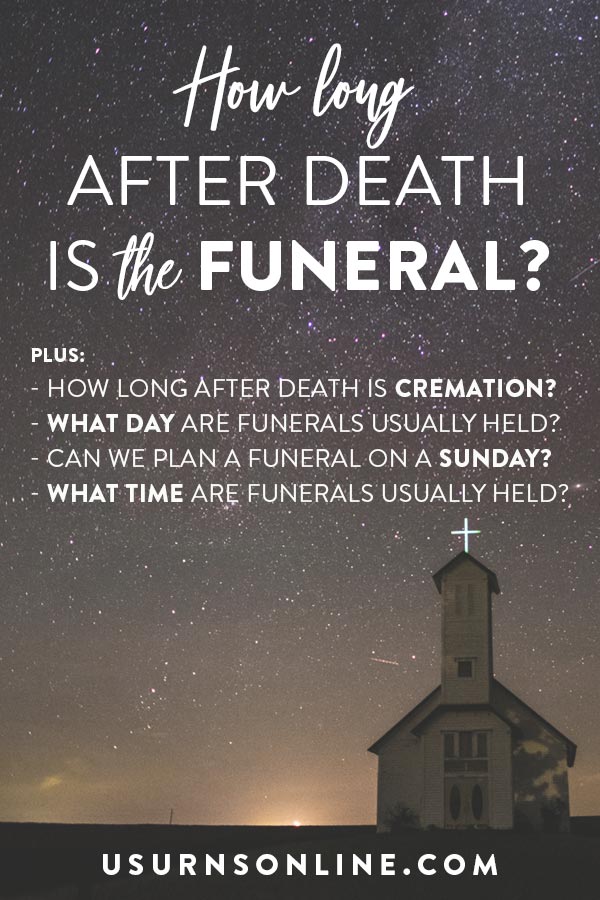How long after death is a funeral held? When will cremation happen? What is the best day of the week for the funeral? What time of day is best? Can I plan a funeral on a Sunday?
You probably have many questions like these about the timeline of events that needs to take place after your loved one passes away.
There are difficult decisions to make, many arrangements to be decided on, and you probably already have family and friends asking when the funeral will be held.
In all transparency, you have relatively short timeframe. The funeral service will have to take place fairly soon after your loved one’s death if you don’t intend to have them cremated, but where should you start?
Let’s take a look at the questions below and get you some much needed answers.
What is the average time between death and a funeral?
Typically, a traditional funeral ceremony takes place within a week of death, or up to two weeks with embalming.
So if it feels like everything is happening quickly, that’s because it is. There are many options to consider and decisions to make when it comes to planning a funeral. While 5-10 days is enough time to make the necessary funeral arrangements, it can feel like a bit of a rush.
Historically, funerals had to take place relatively quickly, due to time constraints caused by the inevitable decomposition of the body. But a week’s time is by no means the rule.
In some regions, cultures, and religions funerals may take place as soon as a day or two after death. For instance, the muslim faith actually requires decedents to be buried as soon as possible, preferably within 24 hours.
On the other hand, with proper preservation methods, the length of time between death and the memorial service can be extended, with the funeral occurring two weeks (or even up to a month in some cases) after the passing. Assuming that the body will be present at the funeral, embalming and/or refrigeration will be necessary to keep the deceased well-preserved before the funeral if it will be more than a few days after death.
Urns Made in the USA
Will you be cremating the remains? If so, then funeral timing is an entirely different story altogether. Once cremation has occurred, the funeral can occur whenever, depending on family preferences and availability. On a similar note, in the case that the deceased person is already buried, or their ashes already scattered, a memorial service can be scheduled for any later date.
For more information on the difference between a funeral and a memorial service, see here.
How long after death is cremation?
Usually cremation takes place a few days after the person’s death.
While there are certain laws and cremation regulations outlining exactly when cremation can occur following a death, three to four days remains standard practice. There are multiple practitioners that must issue paperwork, the next-of-kin needs time to sign the cremation authorization, and in some cases a coroner must also authorize it.
Find the perfect cremation urn for your loved one right here.
Does cremation happen before or after the funeral?
Cremation after the funeral means that you can have the body at the service, a public viewing at the wake, or an open casket funeral.
But if you have the cremation first, you won’t be limited to the first week or so after death to hold the memorial service. You’ll have more time and options to prepare and to potentially arrange out-of-town visits and other matters.
Related: 14 Questions to Ask When Considering Cremation
What day of the week are funerals usually held?
Funerals regularly take place on any day of the week.
Saturdays tend to be the most popular day and thus the most busy day for the funeral director. Many families ask for Saturday availability so that family and friends will not have to take off work for the funeral.
Alternatively, Sunday is the least busy day for funerals. This is because society traditionally views Sunday as a day of rest. Some cemeteries will even charge a fee for opening and closing a grave on a Sunday.
Can we plan a funeral on Sunday?
Usually, the answer is yes.
Most funeral homes are more than willing to accommodate for a Sunday funeral, but there are some (usually smaller, family-owned locations) that do not.
As stated above, be aware of any cemetery policies regarding burial on a Sunday. Also double-check with the officiant to ensure his or her availability to speak at the service. Otherwise, you should be good to go.
What time are funerals usually held?
Late morning to early afternoon is the most common time frame for funerals.
The deceased’s family often choose this time bracket so that their guests can stay for a luncheon or reception before heading home.
In contrast, wakes, viewings, and visitations are usually occur in the evening, the night before the funeral.
How long after death is a wake?
A wake (sometimes referred to as a viewing or visitation) will usually happen within a week of death.
So this answer is very similar to that of the question “How long after death is the funeral?”. The wake itself typically takes place the evening before the funeral.
Related: What is a Wake? Etiquette, Expectations, & More
How long can a deceased body be kept at home?
In the United States, state laws dictate how long a family may keep a dead body at home.
External factors can cause this to vary, but typically it is less than five days. In Texas, for example, a body must be at least refrigerated within twenty-four hours of the death.
But if it is embalmed first then transported back to the family’s home for services, it should be fine to stay there for at least several days before final disposition of the body is required. However, we highly recommend that you speak with a funeral professional if you are considering waiting longer than a day to have the funeral home pick up the body.
Special Circumstances
There is nothing black and white when it comes to planning a funeral and memorial events. Every family is different, and each one’s circumstances will differ from the next.
That naturally means that every funeral is different, but an experienced funeral director will know just how to plan for each situation and time frame.
Here are just a few examples:
Two funerals. Mrs. Jones had family in both Florida and Texas, so her children wanted her to have two funerals, with the first one being in Florida. This meant that the funeral director in Texas needed to coordinate with the funeral director in Florida, and was expected to schedule services a little later than usual.
Special requests. Mr. Brown writes in his will that he wishes for his funeral to be on his birthday, but he passed away four months before that date. So, his family decided to go ahead with a direct cremation, and then held his funeral service on his birthday four months later, just like he wanted.
Unexpected recovery. Miss Garcia’s grandmother wasn’t expected to make it through the night, so Miss Garcia went ahead and called the funeral home to make arrangements. As it turned out, her grandmother experienced a miraculous recovery, and went on to live another three years. The funeral director simply filed his or her notes as a pre-arrangement, and returned to them when needed.
Reasons to delay a funeral
Most people think it’s best if a funeral service happens as soon as possible following a death. This is usually due to the widely held belief that the sooner the grieving process can start for the family, the better. But sometimes a family has to delay a funeral for an unspecified amount of time. There are several possible reasons for this. Let’s take a look at just a handful:
- It’s the middle of winter, and there has been a bad ice storm. The city has experienced a power outage, including at the funeral home. The funeral director postpones the service until a later date.
- The deceased has family members from out of state or that live out of country. They need time to travel the long distances back home so that they can attend the funeral.
- The deceased passed away in a different country. The body ships to the U.S. for the funeral, but there are delays occurring due to customs.
- A criminal investigation surrounds the death of a family’s loved one. The coroner has not yet determined the cause of death and cannot release the body until the coroner’s inquest has taken place and the investigation is concluded.
- The family does not have the funds at the time of death to pay for a funeral. They are planning for a direct cremation right now, and will return at a later time to plan a memorial service.
When should I schedule the funeral?
While laws may vary from state to state regarding embalming and refrigeration, to put it simply, there is no set time period in which a funeral has to occur.
Especially when embalming has taken place, there is usually just enough time available for the family to get their thoughts in order and for the funeral director to finalize all of the service details.
Ultimately, it’s up to you. But practically speaking, the time frame to schedule the funeral is usually within one week.
Can you have a funeral 2 days after death?
Yes, you can have a funeral within two days of the death, perhaps even less. You will need to arrange it with the funeral home, and it will be dependent on the availability of the facilities, the funeral director, and any other funeral service elements you want to include.
Special considerations and possible reasons for delay aside, the important thing is to remember that it’s all about memorializing the life and legacy of the person who has died.
In the midst of all the hustle and bustle of funeral planning, here are some helpful tips for keeping your focus on your loved one:
- Keep a photo of them in your wallet or in a frame on your mantle.
- Listen to one of their favorite songs or watch one of their favorite movies.
- Journal about all the good times you had with your loved one (here are some prompts).
- Look through old photo albums to learn more about the life they lived.
We hope that you found this article insightful and helpful. Let us know your thoughts in a comment below.
Read Next: What to Wear to a Funeral?





That’s good to know that you should try to have the funeral within a week of death. I would think that it would be best to have the viewing and things like that before the body begins to decay, so doing it a soon a possible would be best. I should try and get everyone together as soon as possible if I am ever put in charge of a funeral.
this was very well put together information -thankyou
Since my husband passed away in Feb., 2023, I thought that I should hold a celebration of life service for him in May, 2023. I have a lot of out-of-towners attending & I still need to talk to the funeral director about when & where could I bury my husband…I hope to do this on Mon., April 24, 2023. Is this OK?
Hi Margaret,
Yes, that is absolutely ok – many families choose to delay the service until those who need to travel can make it. The main thing is to preserve the body (if doing a full-body burial), otherwise, if the person was cremated, you can set the date of the service to any day of your choice.